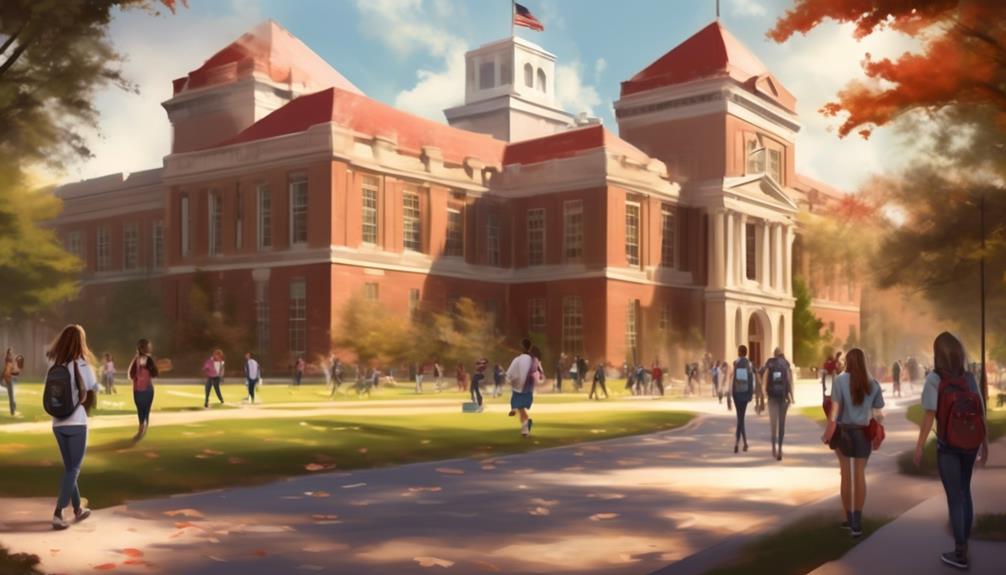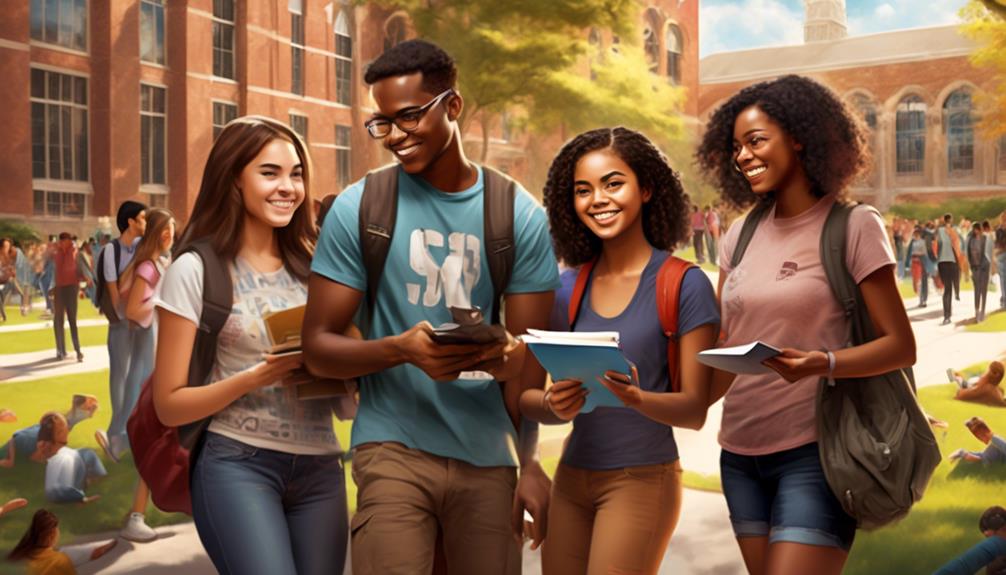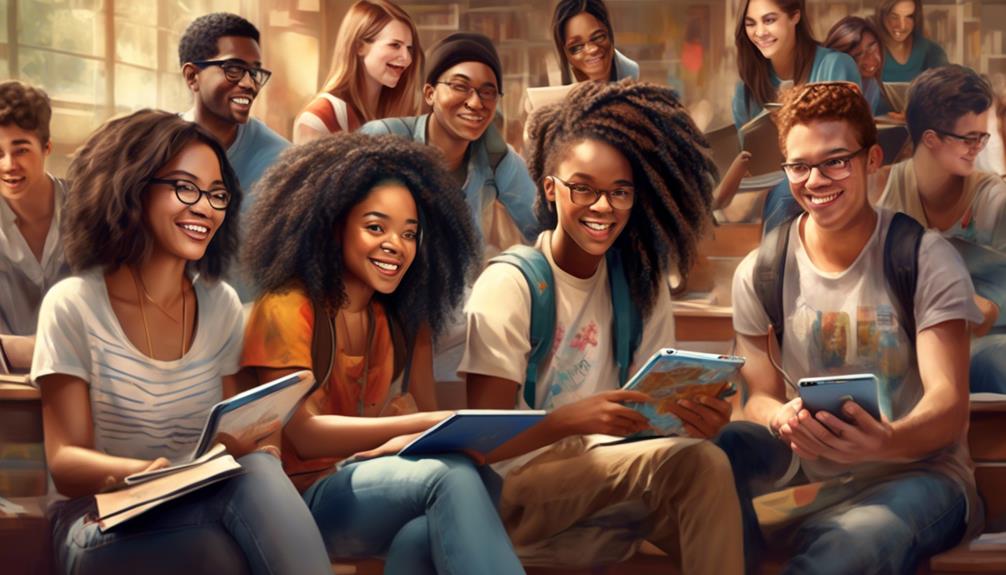We've all heard the buzz about personalization in higher education marketing, but does it truly make a difference in attracting prospective students? The concept of tailoring marketing efforts to individual preferences and needs has gained traction in various industries, but how does it specifically impact the landscape of higher education?
As we explore the nuances of personalization in this context, we'll uncover the potential benefits and challenges that come with implementing personalized strategies.
Join us as we unravel the intricate web of personalization in higher education marketing and discover its potential impact on student recruitment and engagement.
Key Takeaways
- Personalization is crucial in higher education marketing as it helps create genuine connections with prospective students and addresses their individual needs and preferences.
- Implementing personalization strategies, such as leveraging technology and offering tailored experiences, enhances student engagement and enrollment success.
- Technology-driven personalization, including AI tools and conversational websites, plays a significant role in delivering personalized content and interactive experiences.
- Segmentation and targeting are important in higher education marketing to address the diverse needs and preferences of different student demographics, improving engagement and conversion rates.
Understanding Personalization in Higher Education Marketing

When implementing personalized marketing strategies in higher education, it's imperative to understand the unique needs and expectations of individual prospective students. Personalization is at the core of our higher education recruitment efforts. Higher education institutions must prioritize personalization to effectively connect with prospective students.
By leveraging personalized digital experiences on our website, we can address the individual needs of each prospective student. This approach allows us to tailor our outreach and engagement strategies to resonate with modern students. Utilizing technology-driven personalization, such as AI tools and conversational websites, can significantly enhance our recruitment efforts.
Understanding the importance of personalization in higher education marketing is crucial for standing out in a competitive landscape. It enables us to create genuine connections with prospective students, ultimately increasing leads and applications. By recognizing the significance of personalization, we can effectively navigate the unique challenges and expectations of modern students in the higher education space.
Embracing personalization is key to increasing visibility and making a lasting impact in the higher education marketplace.
Benefits of Personalization
Personalization in higher education marketing offers significant advantages, including increased student engagement and improved conversion rates. By providing students with a personalized experience, higher education institutions can effectively improve student engagement and create a meaningful connection.
In today's digital age, students expect a tailored approach that speaks directly to their individual needs and interests. Personalization in higher education marketing allows institutions to address these expectations, leading to higher levels of engagement and interaction with prospective students.
One of the key benefits of website personalization is the ability to create a more relevant and engaging experience for students. This can include personalized content, recommendations, and messaging that resonates with individual students. Such tailored experiences can lead to increased time spent on the website, higher click-through rates, and ultimately, improved conversion rates.
Moreover, the ability to personalize communications and outreach efforts can significantly impact enrollment marketing. By delivering the right message to the right student at the right time, institutions can enhance their relationships with students and increase the likelihood of enrollment.
Implementing Personalization Strategies

How can higher education institutions effectively implement personalized marketing strategies to enhance student engagement and enrollment success?
Implementing personalized strategies in higher education marketing involves leveraging technology to deliver tailored experiences. Colleges and universities should focus on creating personalized content to cater to individual student needs and preferences. Utilizing AI tools and conversational websites can facilitate personalized interactions, providing Gen Z students with the individualized attention they seek.
By personalizing the website experience, institutions can guide potential students through the enrollment process, addressing their specific queries and concerns. This approach not only enhances student engagement but also increases the likelihood of successful enrollment.
It's crucial to set a new standard by offering personalized experiences that resonate with each student, ultimately fostering a genuine connection. Embracing impactful personalization in enrollment marketing aligns with expert perspectives, reinforcing the importance of addressing individual student needs and creating a lasting impact.
As higher education institutions embrace tech-powered personalization, they're better positioned to attract and retain students in today's competitive landscape.
Technology in Personalization
As we explore the role of technology in personalization, higher education institutions can leverage advanced tools and AI capabilities to deliver tailored content and interactive experiences for prospective students. This enables the creation of personalized digital experiences that cater to individual student needs and preferences.
Utilizing technology for personalization in higher education marketing allows for the implementation of customized messaging and content delivery based on user behavior and interests. This ensures that students receive personalized recommendations and information that resonates with their specific educational aspirations and requirements.
Additionally, tech-powered personalization, such as chatbots and virtual events, can create real-time, interactive engagements with prospective students, fostering a more personalized and immersive experience.
These advancements in technology enable the mass personalization of content, making it achievable to provide tailored information and guidance to a large audience.
- Tailored content delivery based on user behavior and preferences
- Utilization of AI tools to understand and predict user needs
- Real-time, interactive engagements with prospective students through technology-powered personalization
Segmentation and Targeting

Segmentation and targeting in higher education marketing involve dividing the market into distinct groups and selecting one or more segments to target with tailored marketing strategies. By doing so, we can better understand the specific needs and preferences of different groups of prospective students. This enables the creation of personalized messaging and content that resonates with each segment.
High school students, for instance, may respond more positively to content that highlights the student experience and campus life, while adult learners may be more interested in flexible program options and career outcomes. Segmentation and targeting allow us to allocate resources more effectively and maximize the impact of our marketing efforts.
With personalized strategies for each segment, we can improve engagement, increase conversion rates, and ultimately, drive higher enrollment. It's about delivering the right message to the right audience at the right time, and segmentation and targeting are crucial in achieving this goal.
Real-world Personalization Examples
Utilizing real-world personalization examples has become a pivotal strategy in modern higher education marketing. Personalization is no longer optional, especially when considering the expectations of future students. Here are some real-world examples of personalization in higher education marketing:
- Tailored Landing Pages: Colleges and universities are creating personalized landing pages specifically designed to cater to different student segments. For instance, these landing pages may be customized to provide information specifically relevant to Latino students, addressing their unique needs and concerns.
- Customized Campus Visits: Higher education institutions are personalizing the campus visit experience to cater to individual student interests. By offering tailored tours and meetings with faculty members based on the student's intended major or extracurricular interests, colleges and universities can create a more personalized and impactful experience for prospective students.
- Personalized Communication: Utilizing personalized communication strategies, such as sending targeted emails and brochures based on a student's interests and engagement with the institution, can significantly enhance the overall recruitment process.
These examples showcase how personalization is being implemented in higher education marketing to create more meaningful and relevant experiences for students.
Personalization Success Stories

Implementing personalized communication strategies has resulted in significant improvements in engagement and conversion rates for higher education institutions.
Personalized email messages have proven to be highly effective, leading to higher open and click-through rates, effectively cutting through promotional clutter. Tailored messaging based on majors and interests has allowed schools to attract attention and differentiate their marketing efforts.
This level of personalization has also addressed the diverse needs and expectations of different student demographics, such as first-generation or Latino students, contributing to increased engagement and enrollment. These success stories demonstrate that personalization sets institutions apart from competitors relying on non-personalized mass marketing. It ultimately leads to increased visibility and engagement, contributing to improved conversion rates.
Additionally, research has shown that modern students, especially Gen Z, expect and prefer personalized interactions, making it a crucial aspect of enrollment marketing for higher education institutions. By personalizing the experience for first-time visitors on the website, institutions can make a lasting impression and increase the likelihood of conversion.
Best Practices for Personalization in Higher Education Marketing
Incorporating personalized communication strategies in higher education marketing is crucial for building strong relationships with prospective students and enhancing engagement. To achieve impactful personalization, we need to adopt the best practices that align with today's students' needs and expectations.
Here are some key strategies:
- Utilize Advanced Technology: Implement tech-powered solutions like AI tools and conversational websites to create personalized interactions that cater to individual student requirements.
- Offer Personalized Support: Personalize the support offered to prospective students by addressing their specific needs, whether it's related to academic programs, campus life, or financial aid opportunities.
- Set a New Standard: Aim to set a new standard in higher education marketing by going beyond basic personalization. By offering a personalized journey that addresses each student's unique circumstances, we can significantly enhance their experience and increase engagement.
In today's competitive higher education landscape, effective personalization can set a new standard and lead to significant results. It's essential to leverage these best practices to create personalized experiences that resonate with prospective students and drive successful enrollment outcomes.
Frequently Asked Questions
What Is Personalization in Marketing?
Personalization in marketing involves tailoring strategies and content to individual preferences and needs. It helps create a more impactful and engaging experience for customers. Through tech-powered solutions, such as AI tools and CRM systems, we achieve effective personalization crucial in standing out in a competitive landscape.
What Is Personalized Learning in Higher Education?
We tailor educational experiences to meet individual student needs and learning styles. This involves providing customized content, pace, and support to enhance student engagement and success. By leveraging technology and data, we adapt to each student's strengths, weaknesses, and interests.
What Is Personalization for Higher Education Websites?
We customize higher education websites to provide unique experiences for each visitor. Using geolocation, AI, and interactive elements, we deliver tailored content that engages and informs students, meeting their expectations and increasing conversion rates.
How Does Personalization Fit in Content Marketing Strategy?
We believe personalization in content marketing strategy enhances engagement and relevance for the target audience. It allows for stronger connections with customers by delivering the right message to the right person at the right time.
Conclusion
In conclusion, personalization is a game-changer in higher education marketing. By tailoring our approach to meet the unique needs of prospective students, we can significantly increase enrollment rates and build stronger relationships with our audience.
Did you know that 91% of consumers are more likely to shop with brands that provide relevant offers and recommendations? This just goes to show the power of personalization in attracting and retaining students in the competitive higher education landscape.
